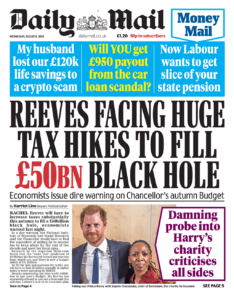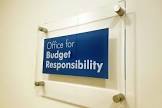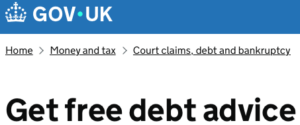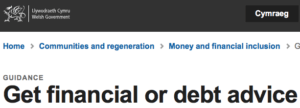- Return to sender - 20th February 2026
- Legal eagle - 19th February 2026
- Round Robin - 19th February 2026

During 23 years with the BBC, and a 42 year journalistic career (when he was trained to use clear and simple language, avoiding jargon), for our Editor, Welshman Phil Parry reporting major events has always loomed large, and often number crunching is essential (although he finds it difficult) – and this is highlighted by new research showing there is an enormous black hole in the public finances today, debt is at record levels, as well as figures revealing that UK Government borrowing has soared.
The bad news stories are coming thick and fast today with numbers, unfortunately, often at the heart of them.
Now we hear of a multi-billion pound black hole in public finances, meaning that huge tax rises will be necessary.
 I need to get my calculator out all the time at the moment to check my sums, because I certainly can’t rely on a pen and paper to add up the figures!
I need to get my calculator out all the time at the moment to check my sums, because I certainly can’t rely on a pen and paper to add up the figures!
The same column of numbers when I check them manually always seem to come to different totals each time!
So it is a problem for me when I study news of the hole in public finances, as well as that it has emerged UK Government borrowing rose significantly more than expected ln June as debt interest payments soared.
State borrowing (that’s the difference between income from things like taxes, and expenditure on the likes of public services), was more than £6 billion HIGHER than in the same month last year, and the media have seized on this incredible statistic.

As a result UK Government borrowing has reached the second-highest level in June since records began in 1993, according to data from the Office for National Statistics (ONS).

Wait for it – June’s borrowing figure was £20.684 BILLION.
This is second only to the highs seen in the early days of the COVID-19 pandemic in 2020, when many workers were furloughed, and it is nearly £4 billion higher than anticipated by economists polled by Reuters.


This is worry enough, but factor in the levels of debt (both in the public sphere and in the private one), and it becomes a NIGHTMARE!
The independent Office for Budget Responsibility (OBR) has warned that the UK’s public finances are in a “relatively vulnerable position”, with pensions costs, climate change and volatile bond markets all posing significant risks.
In its annual assessment of the long-term threats to the government’s fiscal position, the OBR points out that the UK has “the sixth-highest debt, fifth-highest deficit and third-highest borrowing costs among 36 advanced economies”.

In total, the forecaster confirms its previous expectation that without policy changes, UK debt is on course to hit 270 per cent of GDP by 2070 – up from less than 100 per cent today.
The watchdog says efforts to restore the public finances in the wake of a series of big economic shocks (including the pandemic and the energy crisis), have “met with only limited and temporary success in recent years”.
 Household debt too is at record levels.
Household debt too is at record levels.
It seems the UK Government is aware of this issue, and publishes information to help people, and under the headline “Get free debt advice” it declares on its website: “Get free, confidential and independent advice on dealing with debt problems.
 “This list covers UK-wide organisations and ones based in England and Wales. Find out about debt advice in Scotland or debt advice in Northern Ireland.
“This list covers UK-wide organisations and ones based in England and Wales. Find out about debt advice in Scotland or debt advice in Northern Ireland.
“You can also use the Money Helper website to find more free debt advice services.”

In Wales it is a major controversy, and the Welsh Government (WG) proclaims on ITS website: “The Money Helper provides free and impartial money advice. It can help you plan and manage your finances and is set up by UK government”.

After a 2019 report, the debt charity StepChange announced: “Based on general public polling, we estimate that around 8% of adults living in Wales are facing severe debt problems, compared to around 6% of the UK adult population.
“This equates to 193,000 people in Wales in severe problem debt. We estimate a further 412,000 (16% of the Welsh population) are showing signs of financial distress”.
This alarming figure will almost certainly have increased since.

The international outlook also looks bleak, and one of the worst cases is China.
As a proportion of China’s GDP, household debt has risen from less than 11 per cent in 2006 to more than 60 per cent today, close to rich-country levels.
Lenders include state-owned banks and tech platforms.
Between 25 million and 34 million people may now be in default according to Gavekal Dragonomics, a research consultancy.

If those who are merely in arrears are added, the total could be between 61 million and 83 million, or five to seven per cent of the total population aged 15 and older.
In both categories, these numbers are twice as high as they were five years ago, the firm reckons, and amid increasing youth unemployment as well as a property slump, the situation will probably only worsen.
So all in all money worries are big and becoming bigger.
My calculator will be red hot AGAIN!

The memories of Phil’s astonishing, decades long award-winning career in journalism (when numbers were often crucial so always had to be checked) as he was gripped by the rare neurological disabling condition Hereditary Spastic Paraplegia (HSP), have been released in a major book ‘A Good Story’. Order it now.
Tomorrow – how during that long career covering significant events which may not have included statistics was paramount, and incredibly this is now put centre stage by a new book which reveals fresh historical evidence concerning a key episode in the Second World War.









